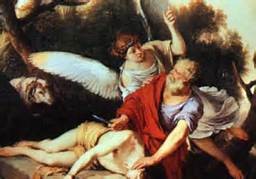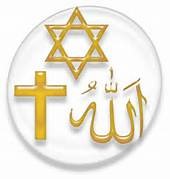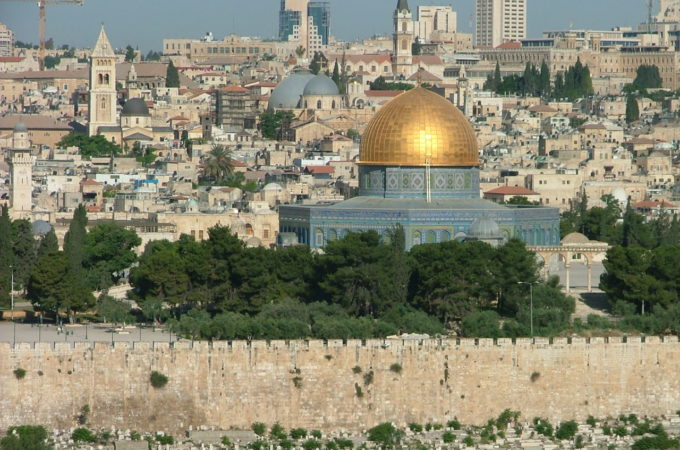The recent attacks on the West by radical jihadists have prompted many people to ask, Do Muslims and Christians worship the same God?
In 638 AD, when the Muslims conquered Jerusalem, they sought to create a symbol of the superiority of Islam by building the Dome of the Rock on the Temple Mount, smack in the middle of the Jewish temple grounds, on Mount Moriah. There, say the Jews, Abraham was prepared to offer Isaac until the angel stopped him. Muslims say the son being offered was Ishmael, father of the Arabs.
The Dome of the Rock remains a shrine for pilgrims and is Islam’s third holiest site. An inscription at the entrance reads:
“He is God,
He is one,
He has no companions,
He does not beget,
He is not begotten”
This is a direct challenge to the biblical revelation of the Trinity, the unity and diversity of God.
Do Muslims and Christians worship the same God? Before declaring a simple Yes or No answer, let’s consider the commonalities and differences between these two understandings of God. (For reasons that will become clear below we will add Judaism to the mix as well.)
Commonalities between Muslims and Christians
In contrast to Atheism (no God), Monism (one undivided spirit), Polytheism (many finite gods), and pantheism (God and the universe are one) stands Monotheism. Muslims and Christians, as well as Jews, all confess belief in the One Infinite God, Creator of heaven and earth.
 All three trace their lineage back to Abraham. Arabs (the vast majority of Arabs are Muslim) are Abraham’s descendants through Ishmael, the Jews (and Christians) through Isaac.
All three trace their lineage back to Abraham. Arabs (the vast majority of Arabs are Muslim) are Abraham’s descendants through Ishmael, the Jews (and Christians) through Isaac.
These three monotheistic faiths have more in common with one another than with pagan religions and certainly more than with Secularism–Atheism. They are people of the Book; they believe in revelation. God has spoken to humankind. They believe:
- In one infinite-personal God.
- There is truth and moral order in the universe.
- They have a mission. While the concept of mission is common, the nature of the mission is different. For the Jews, the mission is to settle the promised land. For Christians, to advance the Kingdom of God. For Muslims, to establish a global caliphate
Differences between Muslims and Christians
While the three monolithic faiths have much they agree upon, especially in contrast with atheism, they have major points of divergence.
One point of divergence relates to revelation. For the Jews, it is the Hebrew scriptures (what Christians call the Old Testament). For Christians it is the written word (Old and New Testaments) and the Living Word, Jesus Christ. For Muslims it is the Quran and the prophet Mohammed.
But we have moved away from our central question, do Christians and Muslims worship the same God? When we consider two critical issues—the nature of God and the character of God—we see the answer is clearly No.
While Jews, Muslims and Christians all believe in one God, they differ on whether God is an absolute (single) one or a united (combined) one. Islam and modern Judaism are unitarian. They understand God to be a single unity. The Arabic word that describes this is توحيد tawḥīd, meaning the oneness [of God] and signifies the indivisible oneness of God.
The Jews have a rather unique understanding of “one.” In the English, when we say “one” we mean absolute one or single one. This is very much like the Arabic tawhid. But the Jews had two words for one. The first is similar to tawhid. It is the Hebrew word yā·ḥîḏ – Yachid – “single,” “absolute numeric one” or “indivisible” one; as in 1=1. This is the unitary concept of one.
But Hebrew has another concept of one, i.e. ʾě·ḥāḏ – Echad. This word means “united,” “compound,” or “bound together.” Genesis 2:24 uses echad to declare “Therefore a man shall leave his father and his mother and hold fast to his wife, and they shall become echad.” Two combine as one flesh, 1+1=1. The same word is found in the Jewish prayer, the Shema in Deut. 6:4: “Hear, O Israel: The Lord our God, the Lord is Echad.” Christian theologians see this as a reference to the Trinitarian nature of God. God is three in one, 1+1+1=1.
So, there is clearly a difference. While both Islam and Christianity are monotheistic, Christianity is trinitarian and Islam is unitarian. This is the point of the plaque at the entrance to the Dome of the Rock. Devout Muslims see Christianity as a heresy. They incorrectly think Christians worship three gods.
In his remarkable book Answering Jihad, Dr. Nabeel Qureshi, a former Muslim who has come to Christ, summarizes:
Christians worship the triune God: a father who loves unconditionally, a Son who incarnates and who is willing to die for us so that we may be forgiven, and an immanent Holy Spirit who lives in us. This is not who the Muslim God is, and it is not what the Muslim God does. Truly, Tawhid is antithetical to the Trinity, fundamentally incompatible and only similar superficially and semantically. Muslims and Christians do not worship the same God.
So while Christians, as monotheists, have more in common with Muslims then they do with atheists, they do not worship the same God.
As Christians, we should love all Muslims. But we must not try to “bridge” to Islam by claiming to worship the same God.
- Darrow Miller







6 Comments
Bekako
October 11, 2016 - 12:49 amThis blog is quite interesting for me. Before some ten years ago, i had a course on Islam and Christianity and my instructor was a doctor with Islamic back ground. He tried to equate (make them one and the same) Alah and God. His intention was to conclude Christians and Muslims worship the same God.This formula didn’t give me comfort and i was arguing the issue is not language, but the way we understand God, as you said Unitarian and Trinitarian. When i understand God as God father, the creator, God son , the redeemer, God Holy Spirit, the comforter and guider, a Muslim guy on the next seat has no meaning for God Son and God Holy Spirit. Therefore, for me and for him, the understanding is different and we are not worshiping the same God.
admin
October 11, 2016 - 8:47 pmYes, Bekako. Thanks for your summary. What we have in common, despite our differences, is our common humanity, and the recognition of the Creator God. We have far less in common with our secular/materialistic neighbors.
Jesús Florin
October 11, 2016 - 9:50 amGreat article. Some persons thing, exist so many paths for being with God, in the final is the same, the same God. But, is only one way for be with God “Jesuschrist”
Randy Uthe
October 25, 2016 - 3:04 pmTrue, but beyond tawhid and echad, you also have to include the Qur’an’s use of ahad. If you do so with the likely interaction that took place between Muhammad and both Judaism & Christianity, I think you have to conseed that a total compartmentalized theology was probably not the end product you now describe. Now, given the different languages and cultures that Islam has been growing up in, the need for their rationalized uproach to God would also develop accordingly to a greater tawhidic theology. Still, I argue that creates the differences in the understanding of Yahweh’s nature and character; but not necessarily creates an entirely different deity.
admin
December 14, 2016 - 11:21 amRandall, as usual, thanks for your thoughtful response. I am sorry for my delayed response.
You mention the likely interaction between Muhammad and the Jews and Christians would likely lead to a different conclusion than I had reached. It seems that Muhammad, when he was in Mecca, tried to convert both Jews and Christians to believe in Allah. When they failed to follow him, Muhammad moved to Medina and changed his tactics, but not his goal. His goal was still to convert Jews and Christians, but now his tactic was to bring conversion through the sword. Why was this so important, if they worshiped the same God?
Nabeel Qureshi, a young man raised as a Muslim who became a follower of Jesus, speaks of the distinction between the Muslim concept of God and the Christian concept of God, here:
https://l.facebook.com/l.php?u=https%3A%2F%2Fyoutu.be%2Fm0jDTFyHluw&h=GAQHJz–b
It seems to me that Muhammad’s actions and the inscription placed at the Dome of the Rock after the conquest of Jerusalem by the followers of Muhammad, is a clear indication that they understood that Allah was a very different God than Jehovah God.
“He is God,
He is one,
He has no companions,
He does not beget,
He is not begotten.”
Samuel Vanlalthlanga
October 27, 2016 - 2:06 amIn continuation to what have been said, Muslims do not accept the Crucifixion of CHRIST and His Resurrection, the central threads of our belief. So, how can we worship the same God if they do not accept that?